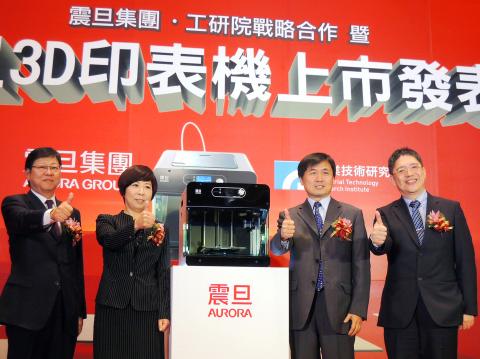Office appliance sales agent Aurora Group (震旦) is aiming to sell its own-brand 3D printers to 200,000 Taiwanese small and medium-sized enterprises, or nearly one-seventh of the total, next year.
The “F1” 3D printer is designed by Aurora and manufactured by automation equipment maker Contrel Technology Co (東捷) using the Industrial Technology Research Institute’s (ITRI) technologies, Aurora said yesterday.
Set to hit the market next month, the F1 3D printer is priced at about NT$100,000 (US$3,400), Tony Tsai (蔡坤明), senior manager of Aurora’s 3D printing business department, said at a product launch event.

Photo: Yang Ya-min, Taipei Times
The price is much higher than the 3D printer made by local electronics conglomerate New Kinpo Group (新金寶集團), which in August said it would begin selling its “da Vinci” printer at NT$15,000 starting this month.
Asked to elaborate Aurora’s advantages in selling higher-priced 3D printers against New Kinpo, Tsai said: “It’s all about the price-performance ratio.”
The F1 also features a user-friendly interfaces to its new product and the firm provides year-long customer service, he added.
Aurora distributes printers for Sharp Corp and Hewlett-Packard Co (HP) in Taiwan and sells Stratasys Ltd’s 3D printers in China. The company also markets office furniture, appliances and supplies.
The company will continue using a business-to-business (B2B) model, rather than a business-to-consumer (B2C) one, to sell its 3D printer, Tsai said.
In a report released in October, market researcher Gartner Inc forecast worldwide shipments of 3D printers that are priced at less than US$100,000 would grow 49 percent to 56,507 units this year.
The figure is estimated to increase 75 percent to 98,065 units next year and rise another 100 percent to about 196,130 units in 2015, Gartner said.
“The 3D printer market is a brand-new market, and we are confident we will hold a notable market share in the long run,” Aurora executive director Alice Lin (林樂萍) said.
After Taiwan, Aurora plans to break into China and then to other overseas markets, Lin said.
To keep up with market trends, Aurora also plans to introduce its own “Aurora Office Cloud” to consumers as soon as the third quarter of next year.
The new could technology service will allow customers to upload and download files to be printed, it said.

Anna Bhobho, a 31-year-old housewife from rural Zimbabwe, was once a silent observer in her home, excluded from financial and family decisionmaking in the deeply patriarchal society. Today, she is a driver of change in her village, thanks to an electric tricycle she owns. In many parts of rural sub-Saharan Africa, women have long been excluded from mainstream economic activities such as operating public transportation. However, three-wheelers powered by green energy are reversing that trend, offering financial opportunities and a newfound sense of importance. “My husband now looks up to me to take care of a large chunk of expenses,

State-run CPC Corp, Taiwan (CPC, 台灣中油) yesterday signed a letter of intent with Alaska Gasline Development Corp (AGDC), expressing an interest to buy liquefied natural gas (LNG) and invest in the latter’s Alaska LNG project, the Ministry of Economic Affairs said in a statement. Under the agreement, CPC is to participate in the project’s upstream gas investment to secure stable energy resources for Taiwan, the ministry said. The Alaska LNG project is jointly promoted by AGDC and major developer Glenfarne Group LLC, as Alaska plans to export up to 20 million tonnes of LNG annually from 2031. It involves constructing an 1,290km

NEXT GENERATION: The company also showcased automated machines, including a nursing robot called Nurabot, which is to enter service at a Taichung hospital this year Hon Hai Precision Industry Co (鴻海精密) expects server revenue to exceed its iPhone revenue within two years, with the possibility of achieving this goal as early as this year, chairman Young Liu (劉揚偉) said on Tuesday at Nvidia Corp’s annual technology conference in San Jose, California. AI would be the primary focus this year for the company, also known as Foxconn Technology Group (富士康科技集團), as rapidly advancing AI applications are driving up demand for AI servers, Liu said. The production and shipment of Nvidia’s GB200 chips and the anticipated launch of GB300 chips in the second half of the year would propel

‘MAKE OR BREAK’: Nvidia shares remain down more than 9 percent, but investors are hoping CEO Jensen Huang’s speech can stave off fears that the sales boom is peaking Shares in Nvidia Corp’s Taiwanese suppliers mostly closed higher yesterday on hopes that the US artificial intelligence (AI) chip designer would showcase next-generation technologies at its annual AI conference slated to open later in the day. The GPU Technology Conference (GTC) in California is to feature developers, engineers, researchers, inventors and information technology professionals, and would focus on AI, computer graphics, data science, machine learning and autonomous machines. The event comes at a make-or-break moment for the firm, as it heads into the next few quarters, with Nvidia CEO Jensen Huang’s (黃仁勳) keynote speech today seen as having the ability to